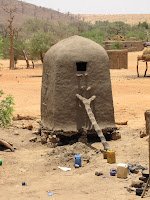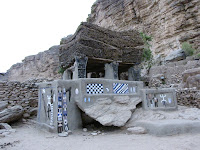
It seems a tradition, when we leave a village, that someone accompanies us to the edge of the village. If there are a few men doing this they take our bags and this bid us a safe journey. The women are too busy for such traditions. They are up early and off to the village well or pump to get the day's supply of water carrying between 15 and 20 kilos on their heads.
The little girls start quite young carrying things on their heads as they copy their mums. They also spend a lot of the day carrying their baby brother or sister on their back as the mum is out working in the fields. We have seen five year olds with a baby strapped on. We could never imagine our kids doing this or walking the long distances that the African kids walk.


These carved log ladders are often well decorated and used to reach the top of the granary or to get to the flat roof where the grain is left to dry.

The granaries sit up on rocks to protect them from vermin while the thatch protects the roof from erosion and water damage during the rainy season.
On the walk from Ireli we passed a small pond full of sacred crocodiles. We saw a few noses breaking the muddy surface of the water but many had gone into the hills to find water there. The rest of the walk we passed through mounded millet fields waiting to be hoed for the next season's crops. The wind was up and blew dust everywhere.
The temperatures on the rocky escarpment that we walked along to Sanga must have been between 45 and 5o degrees in places as it was so hot. We could look down from Sanga to the villages we had left behind.
Seydou took us around Ireli village and showed us some of the sacrifice sites and where the men hold their meetings. The mud buildings were colourfully decorated unlike the others we had seen in the earlier villages.
This old man was busy weaving cotton cloth. He wanted money to have his photo taken. Another group were killing a pig to take to market and charged Chris for his photos.
There are some microfinance initiatives operating in the Dogon area. The locals can borrow at 5% interest over three years and this enables some people to buy a cow, grow crops, or set up a small stall.
On the walk from Ireli we passed a small pond full of sacred crocodiles. We saw a few noses breaking the muddy surface of the water but many had gone into the hills to find water there. The rest of the walk we passed through mounded millet fields waiting to be hoed for the next season's crops. The wind was up and blew dust everywhere.
We stopped for lunch at Ibi village. It was a small quiet place with very little happening and not many tourists stop here. The restaurant workers had to go around the village shops looking for drinks for us. They didn't keep any supplies on hand as they needed the money for their daily needs. A group of about thirty local women gathered under a tree in the restaurant compound and a man was talking to them. Several of them had small children or babies on their back and a few were obviously pregnant. Seydou told us the man was a community health worker and was trying to discourage the women from circumcising their daughters which is the tradition here. He also gave the pregnant mothers free mosquito nets for their babies. It seemed so odd to see a man talking about such subjects to a group of women as we would use a female. But in this society they are used to having to listen to the mens' advice.
Chris went wandering and met a few locals. After a rest here to wait out the hot midday sun we headed for Kundu.
We climbed up through a rocky pass for about three hours. There were a few old men and women collecting firewood on the way. We gave them the last of our kola nuts for which we received wide smiles and a handshake. At the top of the pass was a man setting a trap for genets that hunt at night.
Kundu was a small place too and quite like a fairytale land with its granaries close together. We settled into a guesthouse just before dark. The lukewarn soft drinks we had were very expensive. They had a solar panel to provide light for us on the roof. We had a cool bucket shower and after dinner we moved the tables to put down our mattresses to sleep the night.
In the night there were a couple of small spits of rain, which John and Chris slept through. The next shower had drops big enough to wake us all and become annoying so we packed our beds up and moved downstairs into a room. It was so hot we had trouble sleeping the drizzle had stopped but we were too tired to bother to return to the roof again.
In the morning after a breakfast of fried bread and tea we headed for Sanga where we were to be picked up.
The temperatures on the rocky escarpment that we walked along to Sanga must have been between 45 and 5o degrees in places as it was so hot. We could look down from Sanga to the villages we had left behind.
As we neared the outskirts of Sanga, we herad children shouting. In no time they had gathered their welcome band together and were using plastic drink bottles and empty plastic jerrycans as drums. Some had strips of paper around their waists and paperbag masks on their heads. They had created their own mask dance to collect money off the tourists. This was a town used to tourists and the centre of a few travel and guide organisations. We had lunch here and then headed back to Sevare to stay a night and pick up our stored luggage.



